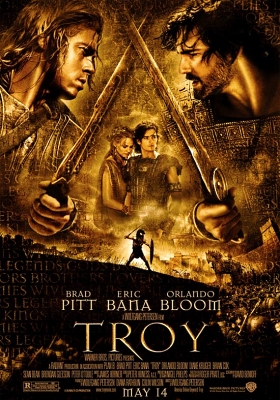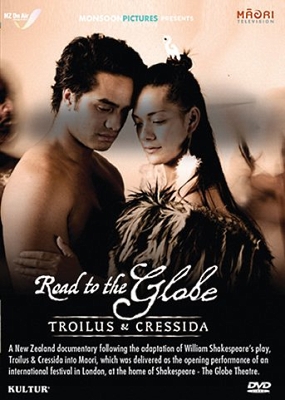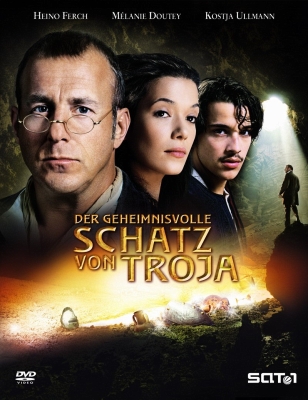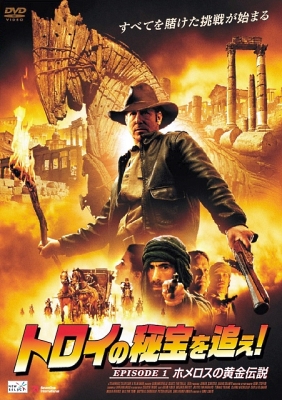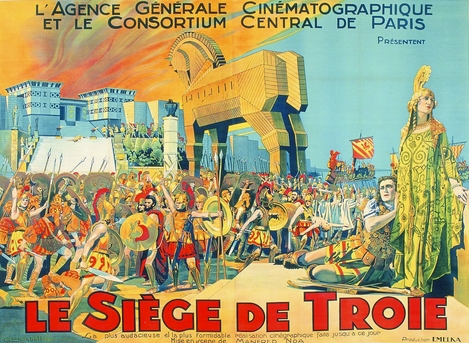
Silent Movie
Directed by: Manfred Noa
Run Time: 219 minutes (Der Raub der Helena is 100 minutes and Die Zerstörung Trojas is 119 minutes)
Starring: Edy Darclea (Helen), Vladimir Gajdarov (Paris), Albert Steinrück (Priam)
Synopsis: Helena. Der Untergang Trojas – titled Helen of Troy in English although the German title translates to Helen: The Fall of Troy – is made up of two movies, originally released separately: Der Raub der Helena (The Abduction of Helen) and Die Zerstörung Trojas (The Destruction of Troy). As described on the DVD cover, the film is “an unjustly forgotten classic epic of the German silent cinema in a newly reconstructed and meticulously restored version. Shooting in Munich and its surroundings with an international cast, director Manfred Noa told the story of Helen of Troy and the decade-long war between the Greeks and the Trojans.”
My Thoughts: Finally, my silent movie obsession makes an appearance on this blog!
I get the impression that most people today have little experience with silent film beyond perhaps having watched one or two poorly preserved comedy shorts played at the wrong speed to mismatched music. Odds are those comedy shorts didn’t look or sound like that when they were originally released, and Helena. Der Untergang Trojas doesn’t look or sound like that either. It’s a big-budget, three-and-a-half hour serious epic with a cast of thousands. For some years, it was believed to be lost, as too many silent films have been, but I’m thrilled that it was found, reconstructed, restored, and provided with a new musical score. Since its 2016 DVD release, I’ve watched it four times.
My favourite thing about this movie is how it looks. Every costume, prop, and set is so detailed, and every frame makes such good use of foreground, midground, and background, that the resulting world feels populated and real. Although silent film is usually accompanied by music, it’s primarily a visual medium, and this movie demonstrates that extremely well. It’s full of gorgeous and moving shots like Hector approaching a hilltop altar against a background of decorated trees while Paris, who Hector thinks is dead, offers thanks to Aphrodite unseen on the other side, or Achilles praying desperately for Patroclus’s safety at a small shrine while women go about their daily chores behind him, or Priam ordering a huge crowd out of the throne room only to remain there alone, a small, helpless figure dwarfed by the room’s oversized architecture.
Helena also makes use of special effects to represent visions or nightmares. The bold use of light and shadow in the Judgement of Paris sequence or the scene where Helen and Paris first meet is reminiscent of more famous German Expressionist films. There are also some small moments taken straight from the Iliad, such as when Achilles pours dirt over his head at the news of Patroclus’s death. Viewers hoping for details accurate to the archaeological record may be disappointed – this movie moves both the Knossos throne and Mycenae’s Lion Gate to Troy – but I’m happy just enjoying the sheer visual richness on display. I suspect I could watch this movie twenty more times and still notice new things going on in the background.
Although Helena generally follows the usual story of the Trojan War, a decent amount of creative license is taken with the lead-up to the war and the relationships between the characters. I really enjoy the different dynamic that’s created by having Helen and Paris meet in a mysterious and isolated temple before either knows who the other is, and by having them arrive in Troy before Paris knows he’s a prince. I also think the way the Trojan royal family breaks apart as the end of the movie approaches is really interesting – Helen is torn between the Greeks and the Trojans, Paris is torn between Helen and Priam, and Priam loses his grip on his sanity as he’s forced to face the fact that his decisions have brought about the destruction of his city. The result is a series of dark and hopeless scenes that somehow makes the destruction of Troy feel even more final than usual.
The majority of the expected scenes are also executed well, but if I have one criticism of this movie it’s its portrayal of Achilles. Helena‘s Achilles constantly gets angry at the smallest insults. His motivations throughout the movie are his crush on Helen and the wreath he won in a chariot race that for some reason she still has eight years later. He agrees to return Hector’s body not because he and Priam reach a shared understanding, but because he wants to exchange it for the wreath. Achilles in this movie just comes off as so petty and petulant, which is not my preferred reading of the character.
The only other criticism I have is less a criticism and more a daydream. The musical accompaniment on the DVD is provided by a piano and a percussion section. This score is never bad or distracting, and in some places it’s quite good – I like the drums that accompany the Paris vs. Menelaus fight and the marimba (I think it’s a marimba?) that accompanies the more supernatural sequences like Priam’s nightmare. But surely an epic of this scale would be best accompanied by a full orchestral arrangement? I would absolutely love to see that someday.
Helena. Der Untergang Trojas is a fascinating, visually stunning adaptation of the Trojan War story and I absolutely recommend it. While of course I would love to see it grow in popularity among fans of Greek mythology on film, I especially hope that, now that it’s easily available, it will grow in popularity among silent film fans. I would love to one day hear it mentioned in the same breath as more famous German silent films like Metropolis (1927) and The Cabinet of Dr. Caligari (1920). I may be biased, since Helena is a retelling of my favourite story, but I daresay it can stand alongside them.
Watch it: At the time of this posting, Helena can be watched in full on YouTube, although with no subtitles available for the German intertitles.
Buy it: Helena is available on a two-disc DVD set from Edition Filmmuseum Shop or Amazon.de. The intertitles are in German; subtitles are available in English and French. This is one of the best physical releases I’ve seen for a silent film outside of the Criterion Collection – it comes with a 20-page booklet (only a few pages of which are in English, but you can still enjoy the pictures), digital images of pamphlets from the 1920s when the film was released throughout Europe, and over an hour of alternate takes and different cuts of the same scenes. It seems Helena followed the silent film trend in that different versions of the movie were released in different international markets – and some of the versions are really different! I really enjoyed checking out all of these DVD extras.
Please note that the DVDs, although region-free, are PAL format. I couldn’t get them to work in my North American DVD player, but I was able to watch them on my North American laptop with VLC Media Player.
Screencaps: Below are five screencaps from the movie that I took to give you a small taste of what it looks like.
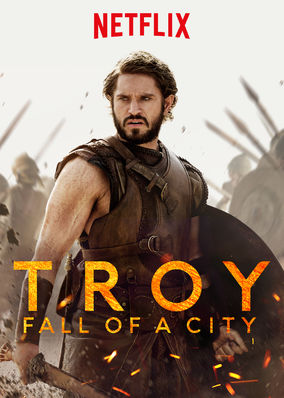
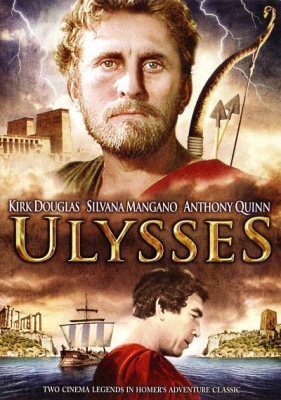
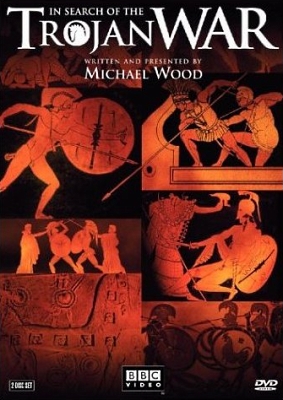 Michael Wood: In Search of the Trojan War
Michael Wood: In Search of the Trojan War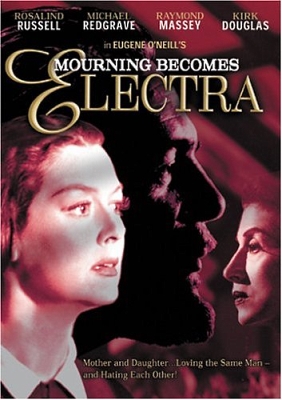 Dudley Nichols: Mourning Becomes Electra
Dudley Nichols: Mourning Becomes Electra